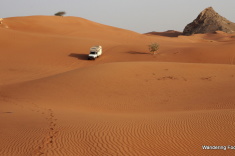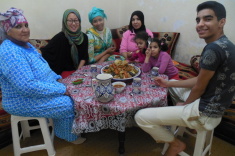In Africa, death is ubiquitous. Every week, I hear of the passing of someone – one week it’s an 11-year old girl dying from a mysterious disease, another week it’s the headmaster of the school being run over by a car.
A few weeks ago, Salathiel the driver’s niece passed away. When he returned to work following the funeral, I conveyed my condolences to him. I was expecting to sense grief and sadness from him. But instead, he began describing the events of the past few days with a factual air.
“I was able to get a loan from the boss, as well as the use of the car, for I had to pick up my niece in the southern part of Zimbabwe, at the border with South Africa. I drove 9 hours to get there, picked her up, brought her back to our village, and purchased the necessary things for her funeral. Between everything, I spent the entire $500 loan from my boss [which, by the way, it will take him 18 months to repay], but I am happy to have been able to do this for my family. No one else was going to be able to do this.”
It surprised me to hear Salathiel speaking in such an unemotional fashion about the death of a family member. If any emotion was present in his tone, in fact, it was relief, gratitude, and happiness that he had been able to perform this duty.
Yesterday, I heard of the passing of a father of a new friend from Harare. This news shocked me, as I had just met her father on Saturday. He had told me he wasn’t feeling well, but he was at work, smiling and going about his business, so he didn’t seem that sick to me. Just 24 hours later, he was dead from pneumonia, at the age of not more than 50.
Speaking briefly to my friend, she too seemed to demonstrate this matter-of-fact attitude about her father’s death. She briefly told me the events of that day, and then, quite calmly got off the phone.
This death shocked me, perhaps because I had just met her father, and suddenly he was gone. I think it also rattled me because it has finally hit home to me that, in Africa, death is an everyday part of life – like bathing, eating, and working. Funerals are just the weekend’s social gathering.
Buddhism stresses the impermanence of life, but this is something I have always struggled with. And as my own family grieves over the recent loss of our own loved one, the Buddhist practice of detachment seems all the more unachievable.
Yet here, in Africa, with its poisonous snakes, unreliable healthcare system, high AIDS rate, and lawless roads, it is evident that death is, in fact, all around us.
Wandering Footsteps: Wandering the World One Step at a Time » A travel journal following a family on their overland trip around the world.
|
|
|



Lexalot - Yeah, I agree that death is a part of life. It must be such a different perception of life that people of war-torn countries like Zimbabwe feel. Even for us though, without the daily threat of loved-ones’ deaths, it must be important to think about our comfort with this inevitable time. I think the best thing is to feel that if you were to die right in this moment, you would be comfortable with what you had accomplished in this lifetime, and where you would now be going. Perhaps you do not need to know exactly where you would be, but I think you need to feel that you had faith that you would not suffer beyond your means- no matter where you end up. Basically, I try to make sure I live each day without regret- so that if I were to die I could be proud of how I had lived my life. If there is anything which remains that needs to be sorted-sort it!